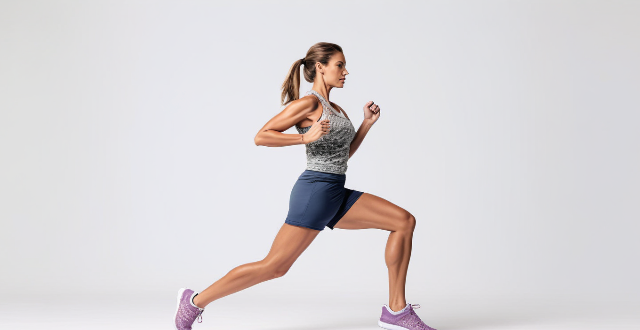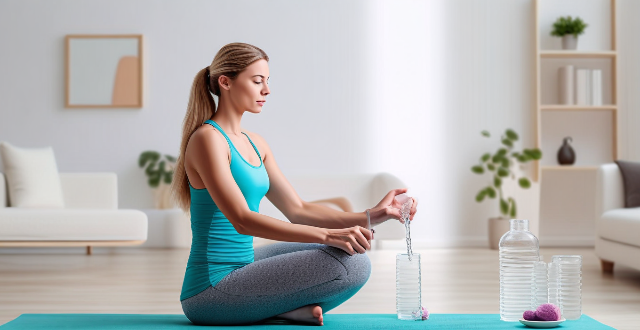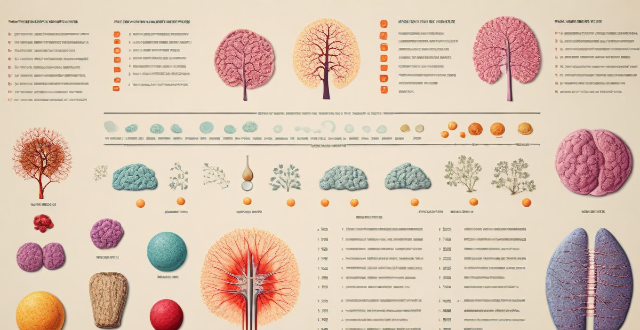Health Body

Can regular physical activity improve mental health ?
Regular physical activity can improve mental health by reducing the risk of depression and anxiety, enhancing self-esteem and cognitive function, improving sleep quality, and reducing stress. Practical recommendations for incorporating exercise into daily routines include starting small, finding enjoyable activities, setting realistic goals, making it social, incorporating strength training, staying consistent, listening to your body, and consulting with professionals.

How can women maintain bone health as they age ?
Maintaining bone health is crucial for women as they age. Here are some tips to help them keep their bones strong and healthy: 1. Get Enough Calcium and Vitamin D: Women should aim to get at least 1,200 milligrams of calcium per day through food sources like dairy products, leafy greens, and fortified foods. Vitamin D helps the body absorb calcium, and it's recommended that women get at least 600-800 IU of vitamin D daily from sunlight, food, or supplements. 2. Engage in Weight-Bearing Exercises: Weight-bearing exercises like walking, jogging, dancing, or lifting weights can help strengthen bones by putting stress on them. This stress signals the body to build more bone, making them stronger over time. Aim for at least 30 minutes of weight-bearing exercise most days of the week. 3. Practice Good Posture and Body Mechanics: Good posture and body mechanics can help prevent fractures by reducing the risk of falls. Stand tall with your shoulders back and your head held high. Use proper body mechanics when lifting heavy objects, bending, or reaching overhead. 4. Quit Smoking and Limit Alcohol Intake: Smoking has been linked to decreased bone density and an increased risk of fractures. If you smoke, consider quitting to improve your bone health. While moderate alcohol consumption may not harm bones, heavy drinking can lead to bone loss. Stick to no more than one drink per day for women. 5. Talk to Your Doctor About Bone Health: As women age, it's important to discuss bone health with a healthcare provider. They may recommend a bone density test to assess your risk of osteoporosis and suggest lifestyle changes or medications if needed. If you have a family history of osteoporosis or other risk factors, your doctor may recommend starting bone-building medications earlier rather than waiting until menopause or later life stages.

How does exercise influence hormone regulation in the body ?
Exercise affects hormone regulation in the body, impactingExercise affects hormone regulation in the body, impacting the intensity, duration, and impacting various hormones depending on the intensity, duration, and type of exercise. Regular exercise can increase testosterone levels in men and estrogen levels in women, reduce cortisol levels, and increase growth hormone levels. It can also improve insulin sensitivity and reduce insulin resistance, as well as maintain a healthy body fat distribution. However, excessive exercise or prolonged periods of intense training can have negative effects on hormone production and lead to low testosterone levels in men, low estrogen levels in women, high cortisol levels, low growth hormone levels, worsened insulin resistance, and decreased body fat distribution. Therefore, it is important to choose an appropriate type of exercise and maintain a balanced lifestyle for optimal hormone regulation and overall health.

Do yoga poses have different effects on the body and mind ?
Yoga poses have different effects on the body and mind, including improved flexibility, strength, balance, stress reduction, concentration, and emotional release. Incorporating a variety of poses into your practice can help you achieve specific goals and transform your body and mind.

How can I modify my workout routine to accommodate my changing body during pregnancy ?
As a fitness enthusiast, it's important to adapt your workout routine as your body changes during pregnancy. Start with low-impact exercises like walking or swimming and gradually increase intensity over time. Focus on strength training and avoid high-impact activities like running or jumping. Listen to your body and adjust your workout routine accordingly. Hire a personal trainer if needed to create a customized workout routine that meets your needs and accommodates your changing body during pregnancy.

How important is hydration in maintaining women's health ?
Proper hydration is crucial for women's health, affecting body temperature regulation, joint lubrication, digestion and nutrient absorption, waste elimination, skin health, weight management, and support during pregnancy and breastfeeding. It is recommended that women drink at least eight glasses of water per day, with individual needs varying based on age, activity level, and climate.

What role does sleep play in maintaining personal health ?
The text discusses the importance of sleep in maintaining personal health, including its roles in physical restoration and repair, energy conservation, weight management, memory consolidation, emotional regulation, cognitive function, stress reduction, mood stabilization, and relationship health. Adequate sleep is crucial for overall well-being, and prioritizing it can support physical, mental, and emotional health.

How does a balanced diet impact women's bone health ?
Balanced diet is crucial for women's bone health, including preventing osteoporosis. Key nutrients are calcium, vitamin D, protein, and phosphorus. Fruits and vegetables also support overall well-being.

Are there specific exercises that help improve mental health ?
Exercises like yoga, meditation, aerobic exercise, resistance training, MBSR, and Tai Chi can help improve mental health by reducing stress, anxiety, and depression symptoms while promoting relaxation, self-awareness, and social interaction.

How can a balanced diet contribute to women's health ?
A balanced diet is crucial for women's health, providing essential nutrients, supporting reproductive health, managing weight, preventing chronic diseases, enhancing mental well-being, promoting bone and digestive health, and improving skin and hair health. By incorporating a variety of food groups, women can ensure optimal physical and mental well-being across their lifespan.

How does hydration impact athletic performance and health ?
Hydration is crucial for athletic performance and health. Adequate hydration maintains energy levels, muscle function, joint lubrication, heart rate, and cognitive function during exercise. Dehydration can lead to fatigue, muscle cramping, increased heart rate, impaired cognitive abilities, and decreased physical performance. Proper hydration also aids digestion, kidney function, skin health, immune system function, and body temperature regulation. Chronic dehydration can increase the risk of kidney stones, digestive issues, weakened immune system, and other health problems. Therefore, it is essential for athletes to stay well-hydrated to achieve optimal performance levels and support their overall health.

In what ways does poor personal hygiene impact mental health ?
Poor personal hygiene can negatively affect mental health by causing decreased self-esteem, social isolation, and exacerbating symptoms of mental health disorders. It is important to maintain good hygiene habits for overall well-being.

What are the essential nutrients for women's health ?
Essential Nutrients for Women's Health Women's health requires attention to various aspects of nutrition, including essential nutrients such as calcium, iron, folic acid, vitamin D, omega-3 fatty acids, vitamin B12, fiber, vitamin C, zinc, magnesium, iodine, vitamin E, vitamin A, copper, choline, selenium, and potassium. These nutrients are crucial for maintaining good health, building and maintaining strong bones and teeth, making hemoglobin, preventing neural tube defects in developing babies, supporting bone and immune system health, supporting heart health and brain function, aiding digestion, helping form collagen in skin, important for immune system function, involved in more than 300 bodily processes, essential for thyroid function, acts as an antioxidant in the body, important for vision, helps the body form red blood cells, important for brain development and health, and acts as an antioxidant in the body. A balanced diet rich in these essential nutrients is crucial for women's health, and it's important to consult with a healthcare provider or a registered dietitian to ensure individual nutritional needs are met.

How does exercise contribute to bone health ?
Exercise contributes to bone health by increasing bone density, improving balance and coordination, strengthening muscles, improving posture, reducing inflammation, and enhancing cardiovascular health. This reduces the risk of osteoporosis, fractures, back pain, and other health issues.

How do different religions view the importance of physical fitness and athleticism ?
This text explores the significance of physical fitness and athleticism in various religions, including Christianity, Islam, Hinduism, Buddhism, and Judaism. It highlights that while each religion has its unique perspective on maintaining a healthy body through exercise and sports, most acknowledge the importance of physical well-being for spiritual growth and fulfillment. The discussion emphasizes key points such as how Christians view the body as a temple, Muslims strive for balance in physical pursuits, Hindus see the body as a vehicle for enlightenment, Buddhists focus on gentle exercises, and Jews recognize the interconnectedness of physical and spiritual health. Overall, the text suggests that taking care of the body is essential across different faiths.

What are the best exercises for a full-body workout at home ?
A full-body workout at home is an excellent way to maintain your fitness levels without the need for a gym membership or equipment. Here are some of the best exercises that you can do at home to get a comprehensive workout: 1\. Squats: Stand with your feet shoulder-width apart and your arms straight out in front of you, then lower your body by bending at the knees and hips until your thighs are parallel to the ground. Pause for a moment, then push through your heels to return to the starting position. Repeat this movement for 10-15 repetitions. 2\. Lunges: Stand with your feet hip-width apart and take a big step forward with one foot, then lower your body until both knees are bent at 90-degree angles. Keep your front knee directly over your ankle and your back knee hovering just above the ground, then push off with your front leg to return to the starting position. Repeat this movement for 10-15 repetitions on each leg. 3\. Push-Ups: Start in a plank position with your hands shoulder-width apart and your feet together, then lower your body until your chest nearly touches the ground. Push through your palms to return to the starting position. Repeat this movement for 10-15 repetitions. 4\. Plank: Start in a push-up position with your hands shoulder-width apart and your feet together, then lower your forearms to the ground so that your elbows are directly under your shoulders. Hold your body in a straight line from head to heels for 30 seconds to a minute. Repeat this movement for 3-5 sets. 5\. Burpees: Start standing with your feet shoulder-width apart and your arms at your sides, then lower your body into a squat position and place your hands on the ground in front of you. Jump both feet back into a plank position, perform a push-up, jump both feet forward so they land outside of your hands, stand up and jump into the air with your arms overhead. Repeat this movement for 10-15 repetitions.